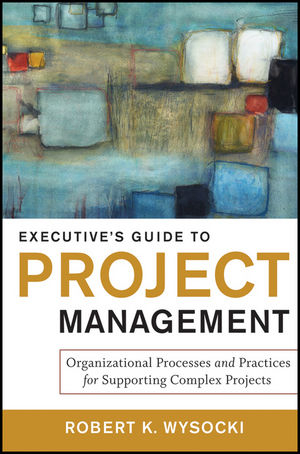
Executive′s Guide to Project Management
John Wiley & Sons Inc (Verlag)
978-1-118-00407-4 (ISBN)
- Titel ist leider vergriffen;
keine Neuauflage - Artikel merken
How-to guidance for defining and implementing a complex project performance environment Sharing his forty-five years of project management experience, best-selling author and industry guru Robert Wysocki presents a straightforward, enlightening, and pragmatic guide to help senior managers make the transition to an organization that profits and thrives on complexity. The first book to discuss practical project management mitigation strategies, Executive's Guide to Project Management presents easy-to-implement infrastructures and processes that will ensure the continued success of your organization and maximize your investment of every project. * Collects in one resource all the relevant information for understanding and creating an environment for improved complex project performance * A must-read for every member of your senior management team * Shows you how to regain responsibility, take action, and skillfully handle complexity to mitigate risk and increase return on project investments It's time for your senior management team to take back control of your investments in projects and programs.
Executive's Guide to Project Management shows you how to cultivate your part of the organization so that it can respond to a changing project environment with the infrastructure to support the project and program investment decisions.
Robert K. Wysockl, PhD, has over forty years of experience as a project management consultant and trainer, information systems manager, systems and management consultant, author, training developer, and provider. He is the founder of Enterprise Information Insights, Inc., a project management consulting and training practice. He has written twenty books on project management and information systems management.
Foreword. Preface. Introduction. The Nature of Project Complexity and Uncertainty. The Risk Mitigation and Business Value Roles of the SMT. Organizational Culture and Velocity. How to Carefully Manage the Creative Process. About This Book. Who Should Read this Book? Part 1: Challenges to Supporting Complex Projects. Chapter 1: The Project Landscape. The Nature of Project Complexity and Uncertainty. Goal and Solution Clarity. Through the Eyes of SMT Members. Putting It All Together. Chapter 2: Project Management Life Cycle Models. Traditional Project Management. Agile Project Management. Extreme Project Management. Emertxe Project Management. How to Choose the Best Fit PMLC. Putting It All Together. Chapter 3: The Complex Project Team. What is a Complex Project Team? Complex Project Team Position Family. Complex Project Manager Use of the Complex Project Team Profile. SMT Applications of the Complex Project Manager Position Family Profile. Putting It All Together. Part 1: Summary. Organizational Challenges and Mitigation Strategies. Executive Bookshelf. Part 2: Improving Project Success with Human Resource Strategies and Processes. Chapter 4: Project Manager, Business Analyst, Business Process Professional, and Information Technology Professional Integration. Position Families. An Historical Perspective. CPT and Complex Projects. Putting It All Together. Chapter 5: A Professional Development Model. The Professional Development Plan. Role of the SMT in the PDP. Putting It All Together. Chapter 6: Integrating Project Manager, Business Analyst, Business Process Professional, and Information Technology Professional into the Project Landscape. Project Complexity Assessment. Generalists versus Specialists. PM, BA, BP, and IT Skill Profile. Mapping the PMs and BAs into the Project Landscape. Putting It All Together. Part 2: Summary. Organizational Challenges and Mitigation Strategies. Executive Bookshelf. Part 3: Improving Project ROI using Agile Project Portfolio Management. Chapter 7: The Project Birth and Death Process. Project Birth Process. Project Maturation Process. Project Death Process. Putting It All Together. Chapter 8: Agile Project Portfolio Management Process. What Is a Project Portfolio? What Is Agile Project Portfolio Management? Putting It All Together. Chapter 9: An Agile Portfolio Strategy. Adapting the PMLC Models to the APPM Model. Problem/Opportunity Prioritization. Strategic Alignment Model. Alternatives to the Strategic Alignment Model. Putting It All Together. Part 3: Summary Organizational Challenges and Mitigation Strategies. Executive Bookshelf. Part 4: Establishing and Maturing an Enterprise Project Support Office. Chapter 10: Organizing and Defining Your Project Support Office. Definition of a PSO. Spotting Symptoms That You Need a PSO. Organization and Placement of a PSO. W Steps to Establishing a PSO. Putting It All Together. Chapter 11: Growing and Maturing your Project Support Office. PSO Stages of Growth. A Step-by-Step Plan. Challenges to Implementing a PSO. Putting It All Together. Chapter 12: The Future of the Project Support Office. Hub and Spoke BP4SO. Putting It All Together. Part 4: Summary. Organizational Challenges and Mitigation Strategies. Executive Bookshelf. Epilogue: Next Steps. Define your role in supporting complex projects. How will you make it happen? Final Thoughts on the Book. About the Author. Index.
| Verlagsort | New York |
|---|---|
| Sprache | englisch |
| Maße | 175 x 235 mm |
| Gewicht | 410 g |
| Themenwelt | Wirtschaft ► Betriebswirtschaft / Management ► Projektmanagement |
| ISBN-10 | 1-118-00407-8 / 1118004078 |
| ISBN-13 | 978-1-118-00407-4 / 9781118004074 |
| Zustand | Neuware |
| Haben Sie eine Frage zum Produkt? |
aus dem Bereich


